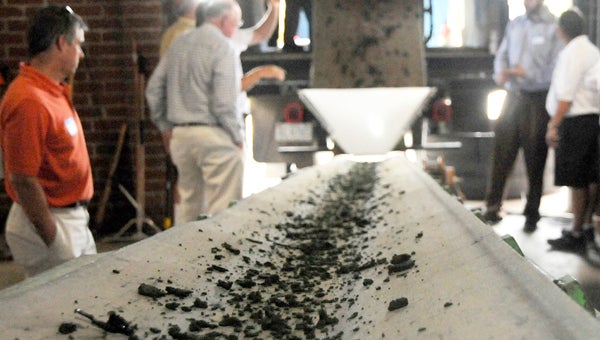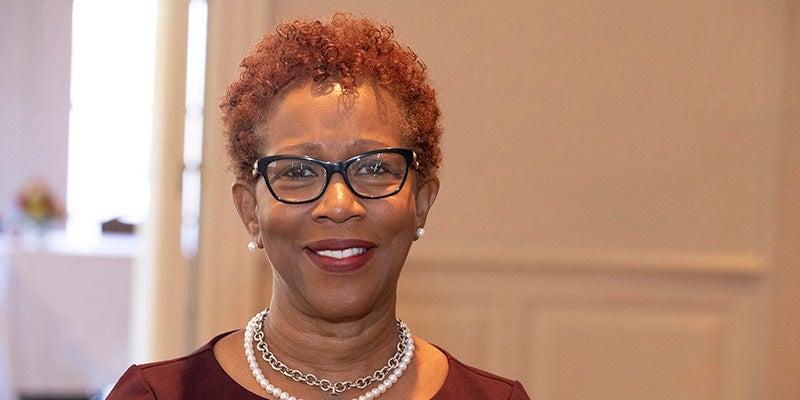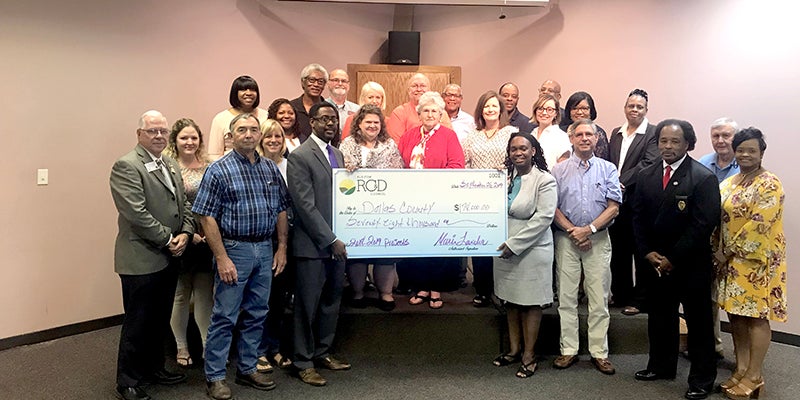Algix welcomes guests to grand opening
Published 1:49 am Saturday, September 14, 2013

Harvested algae is hauled up a conveyor belt into a collection bin Friday at Algix’s facility in Marion Junction. Algix uses the algae, harvested from nearby catfish farm ponds, in the manufacturing of some plastics. — Josh Bergeron
By Josh Bergeron
The Selma Times-Journal
In the North Pacific Ocean sits an island of trash as big as Texas.
The island, called the Great Pacific Garbage Patch, consists of plastics, chemical sludge and other debris trapped in an ocean current.
But a company just outside of Marion Junction is working to make sure the island doesn’t get any larger.
Algix, a company based in Georgia, opened its newest facility in Dallas County that will help turn catfish-pond algae into biodegradable plastic.
“It’s really quite a revolutionary to take algae, which is seen as waste, into a usable product,” marketing specialist Denise Hobart said during Friday’s grand opening event.
The company plans to vacuum algae from catfish ponds into holding tanks and bring the tanks to the Dallas County Facility. Once at the facility, the algae is processed and rides up a conveyor belt to a collection bin.
Algae is eventually placed in a dryer before being shipped to Meridian, Miss., where the algae is turned plastic material. The pellets are then shipped to companies, such as Apple, Clorox, BASF and Shaw.
The company is hoping to help the environment by producing nearly seven million pounds of biodegradable plastic.
Algix supplies larger companies with its plastic pellets for inclusion in products such as smart phones or water bottles.
Many companies are required to pay carbon tax credits, which cost less when biodegradable materials are incorporated, Algix Chief Executive Officer Mike Van Drunen said.
Large companies may not be the only ones benefitting from Algix’s plans.
“We help the catfish farmers by cleaning up their ponds of a product they already want to get rid of,” Van Drunen said.
Approximately 20,000 acres of catfish ponds are farmed by 170 farmers in Alabama.
Butch Wilson, president of Catfish Farmers of America, and a Dallas County catfish farmer, said Algix’s methods would nearly eliminate chemicals costs for farmers.
“The bottom line is going to be affected significantly,” Wilson said. “We will have to use less chemicals and farmers will also get cash from allowing Algix to clean up their ponds. Honestly, I think this is like discovering oil.”
But he wasn’t entirely onboard when Algix first moved to Dallas County one year ago.
“I was skeptical at fist,” Wilson said. “I didn’t believe they would be able to do everything they said. We won’t be sure how much it will benefit farmers until they actually begin operations.”
Currently, three catfish farmers allow Algix to use their ponds as a source of Algae. Van Drunen said he hopes to have 500 famers participating by the end of 2016.
Representatives from China’s plastics and fishing industries and Ford Motor Company attended the grand opening.
But consumers shouldn’t expect to see Algix plastics in cars just yet. Van Drunen said companies ask for thousands of pounds of biodegradable plastic just for testing before committing to a contract.
Van Drunen said Algix is not able to fill large orders currently, but has plans to harvest three million pounds of algae and produce seven million pounds of plastic by 2014.



